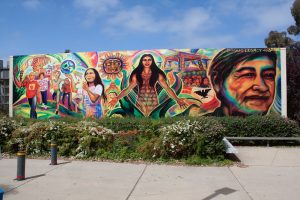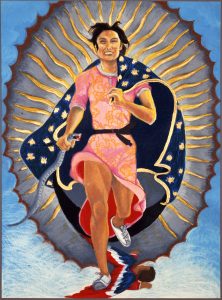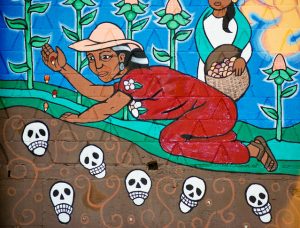Jaslyn McCarron-Mathis
Introduction
Chicana art is an important source of feeling and education on the Chicana experience as well as giving it’s viewer an insight onto both the pride and struggles of that particular artist. Through themes such as the spiritual, land/labor, and the self/identity we gain a look into the lives of many Chicana artists. In an attempt to be specific and provide artists to look at, I will be talking about examples of art I have as well as mentioning artists like Ester Hernandez and Yolanda Lopez.

Spiritual & Ecological
This mural depicts the many different facets of Chicano society, it displays fighting for their rights, their indigenous roots, as well as the Earth/land. The spiritual and ecological themes are captured within this piece of art and give the viewer a look into the Chicano experience. Ester Hernandez is a Chicana artist who uses both of these themes within her artwork. She uses them to talk about her community and her interests in political action. The use of spiritual themes in Chicana art can be tied to the concept of Aztlan, a symbol for Chicano people that is tied to the land. When spirituality is tied into art, especially art done by the so-called “other” it reflects the importance of it to them and how, often times when colonized, a different religion is pushed onto them. Embracing spirituality as your community knows it is an act of decolonization.

Spiritual & the Self
This is a painting done by Yolanda Lopez, a self portrait of her as the Virgin of Guadalupe, a spiritual icon. Lopez depicts herself in this image as a way to pay respect to the working-class woman, to create the idea that a Chicana woman does not have to be the “ideal woman” portrayed by many virgin idols. To decolonize the idea that women have to act a certain way to be deemed desirable is a revolutionary act and it is done through this piece of art. She depicts a new kind of beauty through the muscular stature drawn, breaking down more of the image of an ideal Chicana. Using the self as a form of expression here challenges what a Chicana woman is and what she can be outside of the lens created by colonialism.

Land/Labor
This small piece is part of a bigger mural called “8 Stages in the Life of a Chicana”. This mural is accompanied by a poem and part of it between this image and the previous as well as the next is this: “Enséñese … …y nunca muere de hambre Mirame y Fijate la Vida de UNA Suficiente mujer del uno mismo” and “As I search for the Truth I find myself Past the lies and stereotypes I begin to understand what being CHICANO means”. This image specifically is of an older Chicana woman working, planting what looks to be corn in a cornfield. The depiction of this paired with these parts of the poem makes the connection between what I believe to be taking care of the self through a connection with the land. Such a connection is one that, during colonialism, was cut from many people in a way that is both sufficient for the individual and the land itself.
Application
Chicana art is important to us and should be viewed with that in mind because it expresses cultural values that, through things such as colonialism, have been minimized or almost destroyed. Many Chicana art can be viewed as protest against the colonial mindset that has Othered them for years, it is a way to provide an inside view of how they live their lives and what things mean to them.

